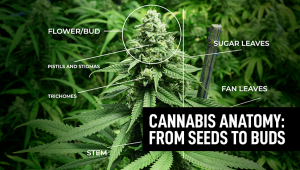How To Tell Sex Of Your Cannabis Plants

- 1. The first signs of pre-flowers
- 2. Male plant characteristics
- 3. Female plant characteristics
- 4. Hermaphrodite plant characteristics
- 5. Using feminized seeds or clones
- 5. a. The benefits
- 6. In conclusion
Sexing cannabis seeds is really just finding out whether they are male or female, this can be very important for various reasons, ranging from a breeding project to extensive phenotype hunting. Knowing how and when to tell if your plants are male or female will give you an advantage when growing indoors. Cannabis is a dioecious plant species. What does this mean? Well, individual plants are either male or female. The male plants produce flowers in the form of small sacs loaded with pollen. Both insects and wind dispersal displace this pollen when the sacs mature, leading to the fertilization of the female flowers.
Female flowers produce bundles of flowers, stems, and leaves known as inflorescences. Many novice growers make the mistake of referring to buds themselves as flowers. However, they are actually bundles of lots of smaller flowers. True cannabis flowers consist of two stigmas (the hair-like protrusions seen around buds), a protective casing tissue called a bract, and an ovule found within the bract at the base of the stigmas. Once male pollen makes contact with the stigma, it fertilizes the ovule, and a seed develops within the shelter of the bract tissue. The dioecious nature of cannabis makes the plant quite unique in the plant kingdom. Most plants are monoecious, meaning that they possess both male and female sexual organs on the same plant. The fact that a cannabis plant could be either male or female can be a problem for cannabis growers.
Most people grow weed to secure a stash of potent female flowers, not for male pollen sacs. Thankfully, the advent of feminized seeds has managed to solve this problem, as these seeds have a 99% chance of producing a female plant. However, other genetics offers a 50% chance of being male and a 50% chance of being female. It might not seem like a big deal, but a male plant in the grow room or garden can greatly reduce the potency and quality of female flowers. Upon fertilization, female plants develop seeds and spend fewer resources creating desirable cannabinoid compounds. Plus, nobody wants to smoke buds loaded with seeds! Thankfully, it’s easy to tell a male plant apart from a female plant before the pollen sacs fully develop. In this article, we explain how to tell the sex of your Cannabis plants, what traits to look for, and what can go wrong.
1. The First Signs of Pre-Flowers
When growing from seed, Cannabis plants will spend the earliest stage of their life cycle focusing on the root, leaf, and stem production. On the basis that a grower keeps a plant growing under 18 hours of light with high humidity levels of close to 75%, for 5-6 weeks then the plants will begin to show preflowers. Pre-flowers offer the first clue about the gender of a cannabis plant. These specialized pieces of plant tissue develop at the nodes, the point at which the branches meet the mainstem. Although they are small, to begin with, both male and female preflowers display characteristics that make them visually distinguishable.
Female preflowers are more teardrop-shaped and have small stigmas protruding from them. In contrast, male pre-flowers are more spherical in appearance and do not possess stigmas. Preflowers can start to develop quickly, so you’ll need to keep an eye on this area when your plants are switching from the vegetative stage of the growing cycle into the flowering stage.
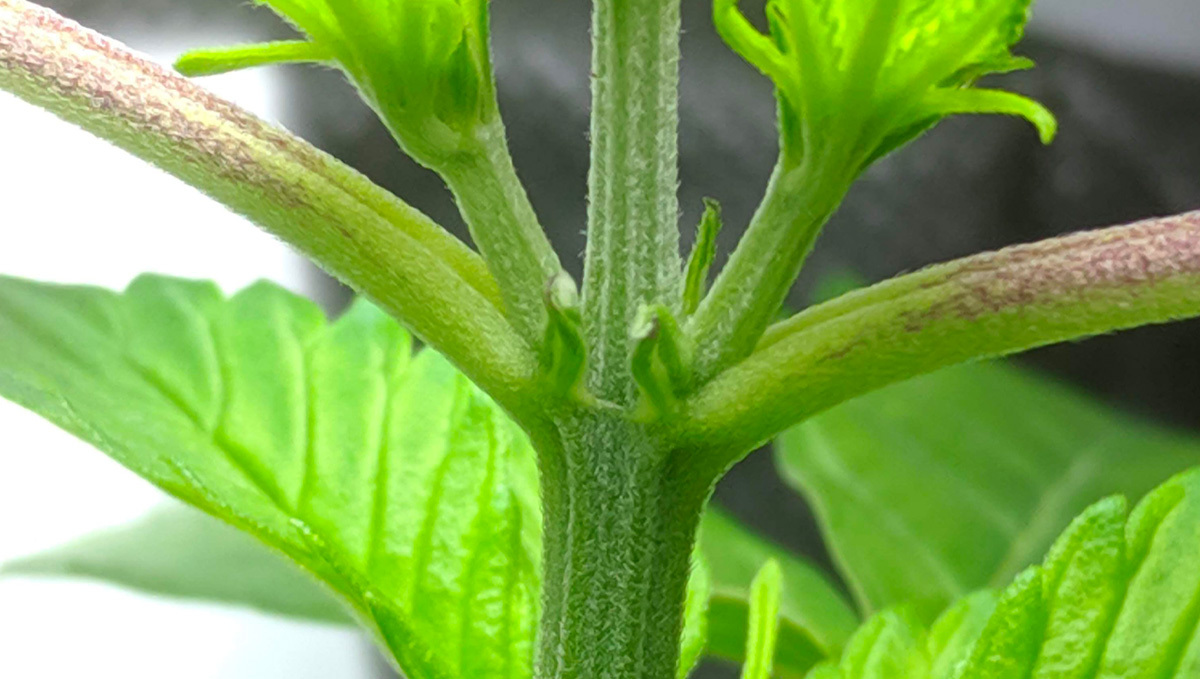
Because photoperiod plants grown indoors require a change in the light cycle, you’ll know exactly when this critical time begins. However, photoperiod strains grown outside require more consistent monitoring, as they flower based on natural light cycles. Likewise, autoflowering plants start to put out flowers based on an internal genetic clock, so you’ll have to pay close attention during weeks 3–4 of the growing cycle. After your plants grow to the 6th or 7th internode, you will be able to identify by eye potential male or female traits. Cannabis plants that are put into flowering from the seedling stage, will still require 3-4 weeks before the first signs of pre-flowers appear. These are the very first signs of the Cannabis plant's sex and will either be a tiny male or female pre-flower. Some cultivars may produce pre-flowers faster than others, however, all plants will reveal themselves around the same time. There is absolutely no need to worry about identifying male plants early on, as they will not be able to produce pollen until a much later time.
2. Male Plant Characteristics
The number one fear any beginner grower has when working with regular sex seedlings is to allow a male to pollinate the entire crop. There is no need to be concerned if your intention is to pheno hunt all the female plants, as removing males before they produce sacs will cause no need for concern. Male Cannabis plants will produce pre-flowers in the same places as the females. Not only does this make distinguishing between the two early on even more difficult, but it may also take a few weeks before you can completely confirm you have a male plant.
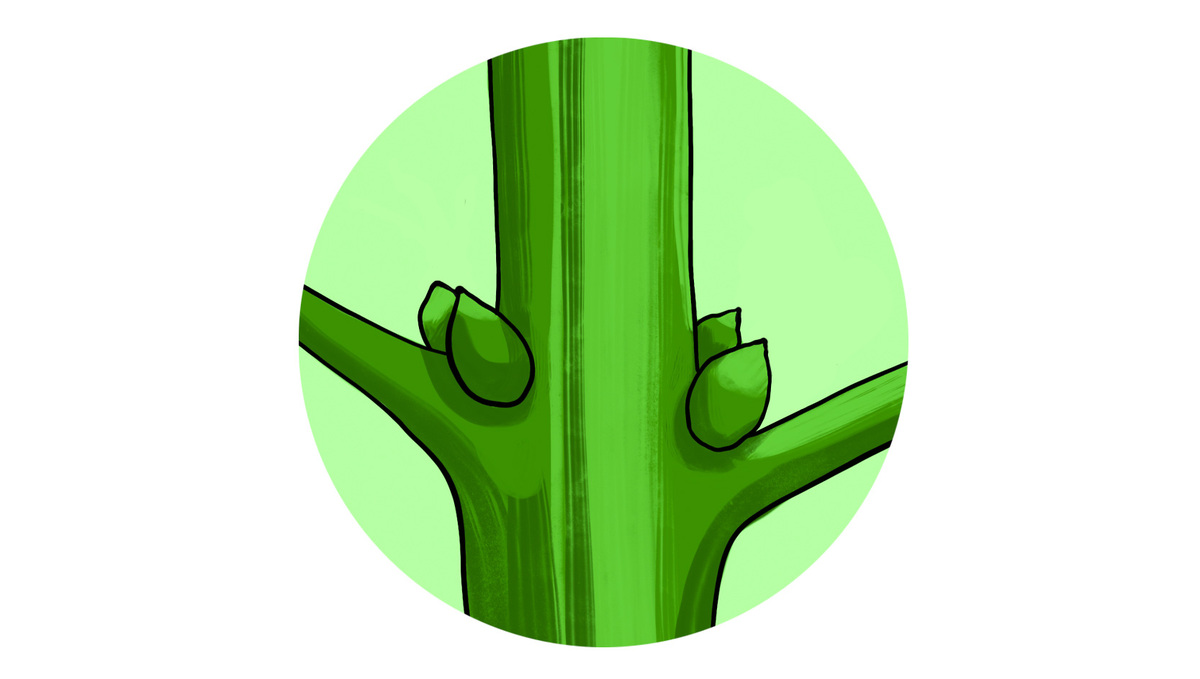
You will notice between the upper internodes, there will be a small cluster of miniature oval-shaped balls. As they mature, you will notice they are attached to a tiny stem and will become bigger and turn green. It is best to wait until you can identify the male characteristics, before throwing any plants out of the garden. Do not be overzealous and potentially discard a female plant.
3. Female Plant Characteristics
It is much easier to spot a female preflower, as you are only looking for a thin, hair-shaped pistil. When these emerge from between the internodes, they will look like a white eyelash or a tiny blade of grass. Over time, white hairs will begin to grow amongst the new growth and can be very hard to spot. Double-check what you identify as the female preflower, and wait until you can clearly see a white pistil.
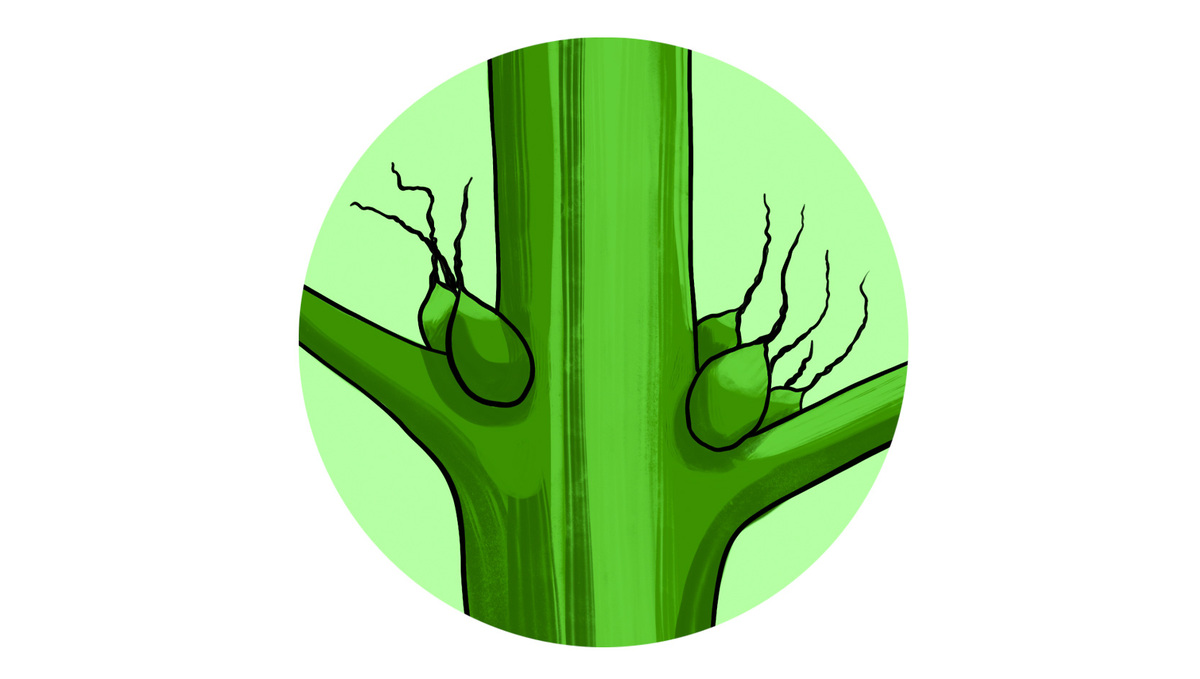
After the first signs of pistils emerge, over the following weeks, the female plants will begin to display an abundance of pistils. This is where plants require higher amounts of Phosphorus and Potassium encouraging flower production and producing buds. It is best to use a magnifying glass, or loupe for checking trichomes to double-check. It may take a week or two before you can confidently say you have a female.
4. Hermaphrodite Plant Characteristics
So, we have gone over both male and female cannabis plants, and how to differentiate between the two. But, there is a third “gender” option when it comes to cannabis plants - hermaphrodites. Hold up, what the hell is a hermaphrodite cannabis plant? A hermaphrodite (hermie is the common term used in cannabis cultivation) plant develops both male and female reproductive traits. This is a natural feature of cannabis, and it is thought that it happens when the plant becomes stressed or injured. This feature ensures the survival of the specific plant’s genetic code, as the plant can pollinate itself.
But, if you are growing cannabis for consumption then the last thing you want is your crop to turn into hermies. Just one hermie put the entire crop at risk of pollination, which is bad for a few reasons. Pollinated female cannabis plants put a lot of their energy production into seed creation, which means the quality of your buds, the size of the yield, and your satisfaction with the entire cultivation process is at risk.
How do you stop your plants from turning into hermies?
There are two main factors that can affect a plant’s sex - environmental stress and genetics. Some strains of cannabis (pure Sativas in particular) seem to be much more susceptible to hermaphroditism. In recent years seed banks and commercial growers have gone a long way in trying to breed this genetic anomaly out of the pool, and at this point, it is not something you should worry about if you are buying your seeds from a reputable source (hint - buy them from us, we ensure a zero percent chance of genetic hermies in our seeds). But, even with the best possible genetics, a plant can turn into a hermie through environmental stress or injury. The golden rule is to avoid all types of stress during the flowering period. Let’s list out the types of situations that might cause a healthy female plant to turn into a hermie:
- Excessive heat (above 28C) in the grow room
- Over-fertilizing your crop
- Watering your plants with water that is either too cold or too hot. Always water your plants with room temp water
- Changes to the light periods. Power cuts can quickly turn a whole grow room into hermies if not remedied quickly
- Damage to the plant itself. Always be super careful when practicing defoliation and never take more than about 30% of the fan leaves off at any one time.
- Over or under watering can also cause this issue to occur.
If you do suspect that you have a hermie in your crop, the best thing to do is to just remove it and (unfortunately) kill it. If the plant is already a fair way into its flowering period when you realize it is a hermie then you have two options. If it has only produced a few small male pollen sacs then they can be removed carefully. Separate the hermie plant from the rest of the crop and use tweezers to carefully remove the sac without them popping. If has already grown multiple pollen sacks, it's time to eliminate it.
5. Using Feminized Seeds or Clones
The only sure way to determine sex before your plants reach maturity is to clone the plant. This could be achieved by taking a clone from any plant. Growing with Cannabis seeds or clones, that are guaranteed to be all-female, has many advantages from the small-scale bedroom grower, to the large commercial ones.
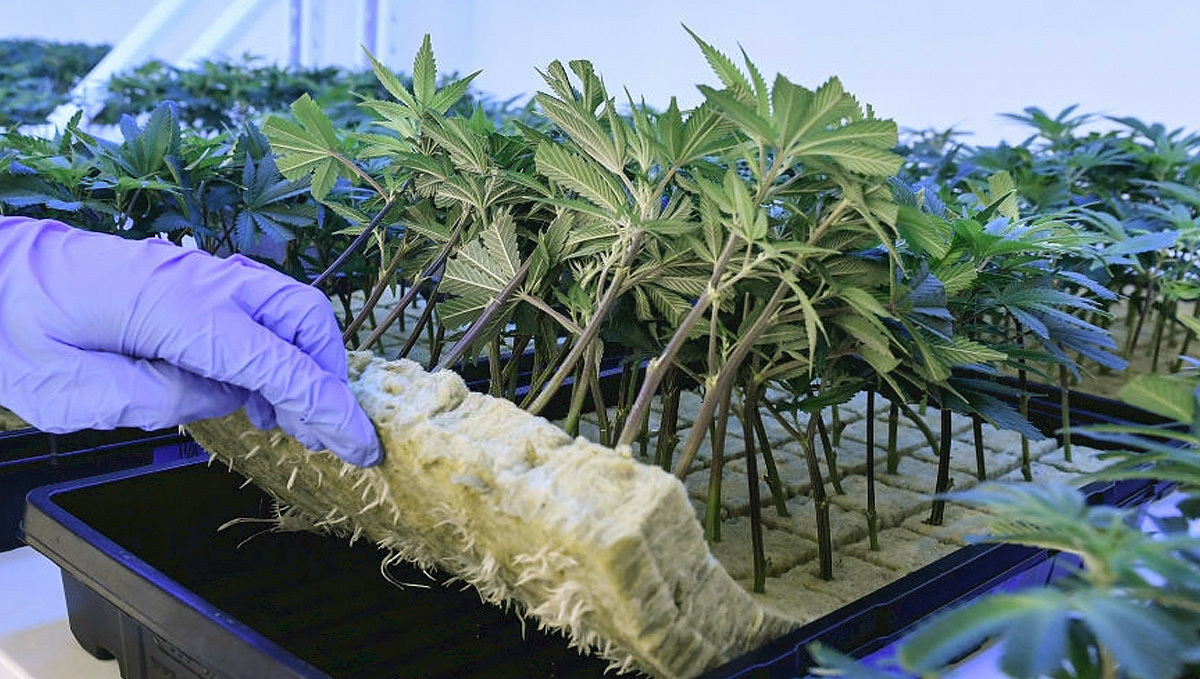
Cut one of the branches then put it into a small cup with medium and let grow for a few days. After the clone’s roots have developed a bit, place it under a 12/12 life cycle. Soon, the plant will reach maturity and show its sex, because clones share the same DNA as the plant where it was taken from, the clone will show the sex the main plant has. Remember that this cannot be used with autoflowers because they start flowering based on age and not photoperiod. If you are not working on a breeding project and your goal is to grow as many female plants as possible, then using feminized seeds or clones is the most practical route to take.
The Benefits
- This will guarantee that the plants you produce will be 100% female, meaning that prior to flowering, there is no requirement to pull plants out of the grow room. This eliminates any waste of space, nutrients, and growing medium.
- Large-scale Sea of Green operations can be set up, without the need to worry about any male plants. This means the crop will not be cross-contaminated with pollen and become seeded and commercially useless.
- Working with clones is an excellent way to grow something that has already been verified. Usually, highly desirable clones can be vouched for by another grower or will have lots of information to research online.
6. In Conclusion
Knowing how to identify male and female Cannabis plants when using regular seeds, is vital to ensuring an all-female crop is maintained. We recommend you take your time before throwing out any plants and be prepared to allow male plants to mature enough to see their pollen sacs forming.








